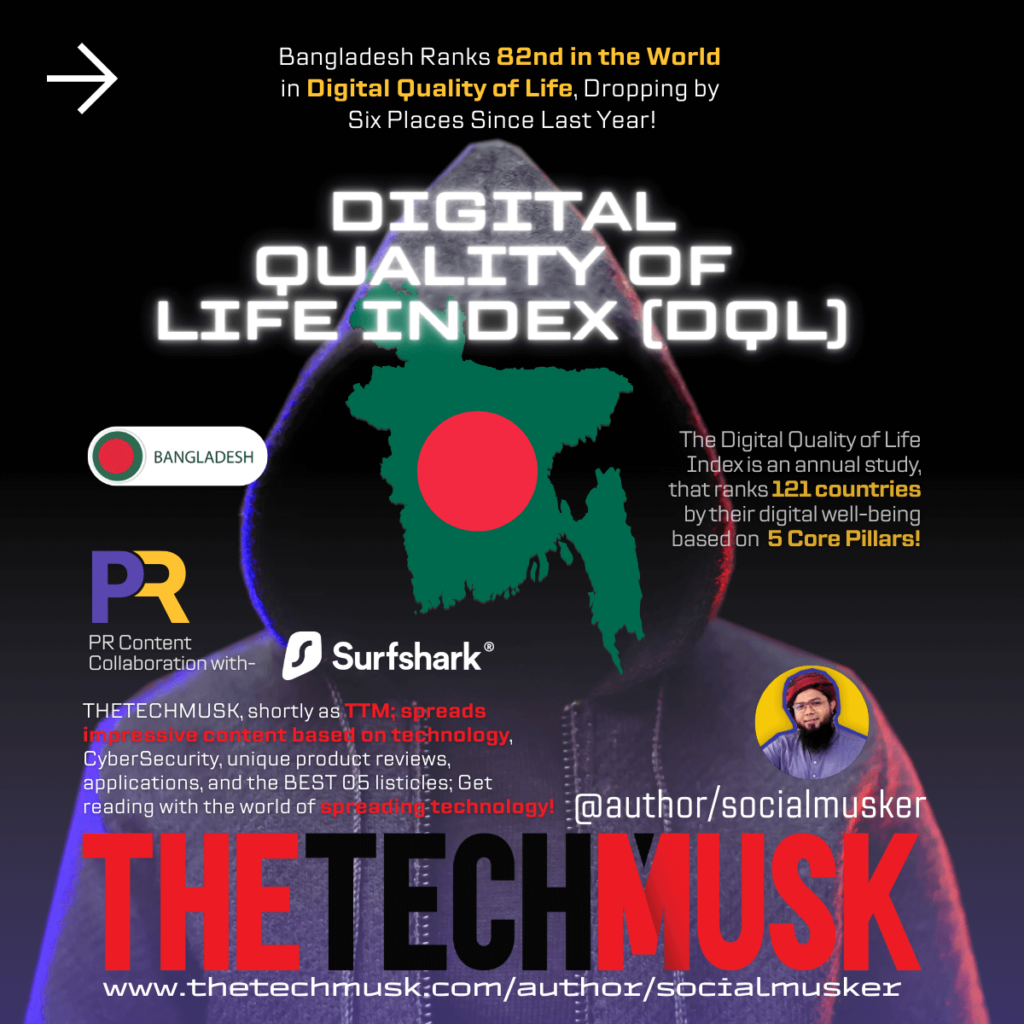The Digital Quality of Life Index is an annual study that ranks 121 countries by their digital well-being based on 5 core pillars
Surfshark’s 5th annual Digital Quality of Life Index (DQL) ranks Bangladesh 82nd in the world, dropping by six places from last year. Out of the Index’s 5 pillars, Bangladesh performed best in internet quality, claiming 65th place, while facing challenges in e-security, ranking 85th. The nation ranks 73rd in e-government, 77th in internet affordability, and 84th in e-infrastructure. In the overall Index, Bangladesh lags behind India (52nd), but surpasses Pakistan (93rd). In Asia, Bangladesh takes 25th place, with Singapore the leader in the region.
“In many nations, ‘digital quality of life’ has merged into the broader concept of overall ‘quality of life’. There’s no other way to look at it now that so many daily activities, including work, education, and leisure, are done online. That’s why it’s crucial to pinpoint the areas in which a nation’s digital quality of life thrives and where attention is needed, which is the precise purpose of the DQL Index”, says Gabriele Racaityte-Krasauske, Surfshark’s spokeswoman.
Bangladesh’s internet quality is 5% lower than the global average.
- Fixed internet averages 53 Mbps in Bangladesh. To put that into perspective, the world’s fastest fixed internet — Singapore’s — is 300 Mbps. Meanwhile, the slowest fixed internet in the world — Yemen’s — is 11 Mbps.
- Mobile internet averages 20 Mbps. The fastest mobile internet — the UAE’s — is 310 Mbps, while the world’s slowest mobile internet — Venezuela’s — is 10 Mbps.
Compared to India, Bangladesh’s mobile internet is 73% slower, while fixed broadband is 31% slower. Since last year, mobile internet speed in Bangladesh has improved by 41%, while fixed broadband speed has grown by 23%.
The Internet is unaffordable in Bangladesh compared to other countries.
- Bangladeshis have to work 4 hours 26 minutes a month to afford fixed broadband internet. While this is less than average, it is 15 times more than in Romania, which has the world’s most affordable fixed internet (Romanians have to work 18 minutes a month to afford it).
- Bangladeshis have to work 1 hour 35 minutes 28 seconds a month to afford mobile internet. This is 6 times more than in Luxembourg, which has the world’s most affordable mobile internet (Luxembourgers have to work 16 minutes a month to afford it).
Bangladesh is 85th in the world in e-security — 10 places lower than last year.

The e-security pillar measures how well a country is prepared to counter cybercrime, as well as how advanced a country’s data protection laws are. Bangladesh lags behind India, which ranks 66th, but outperforms Pakistan (101st) in the e-security pillar. Bangladesh is unprepared to fight against cybercrime, and the country has no data protection laws.
Bangladesh is 84th in e-infrastructure and 73rd in e-government.
Advanced e-infrastructure makes it easy for people to use the Internet for various daily activities, such as working, studying, shopping, etc. This pillar evaluates how high internet penetration is in a given country, as well as its network readiness (readiness to take advantage of Information and Communication Technologies). Bangladesh’s internet penetration is moderate (77% — 77th in the world), and the country ranks 87th in network readiness.
The e-government pillar shows how advanced a government’s digital services are and the level of Artificial Intelligence (AI) readiness a country demonstrates. Bangladesh’s e-government is below the global average.
Globally, the internet is more affordable than last year.
- Fixed internet is 11% more affordable than last year — on average, people have to work 42 minutes less a month to afford it.
- Mobile internet is 26% more affordable than last year — people have to work 41 minutes less to afford it.
METHODOLOGY
The DQL Index 2023 examined 121 nations (92% of the global population) based on five core pillars that consist of 14 indicators. The study is based on the United Nations’ open-source information, the World Bank, and other sources. This year’s study includes four more countries than DQL 2022, reaffirming Surfshark’s commitment to global representation.
Bangladesh’s full profile in the 2023 Digital Quality of Life report and an interactive country comparison tool can be found here: https://surfshark.com/dql2023?country=BD























